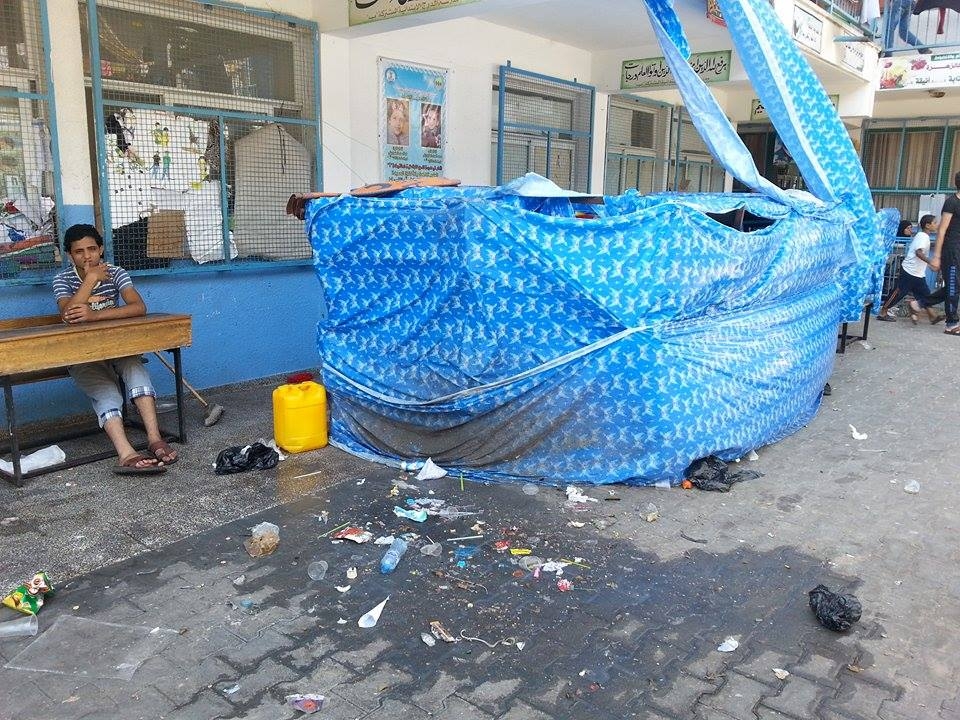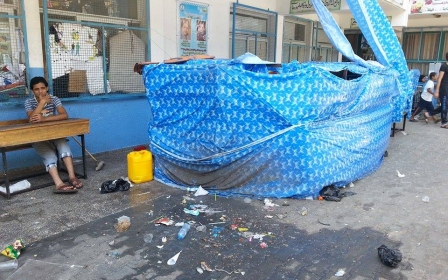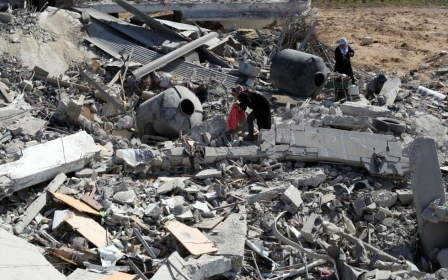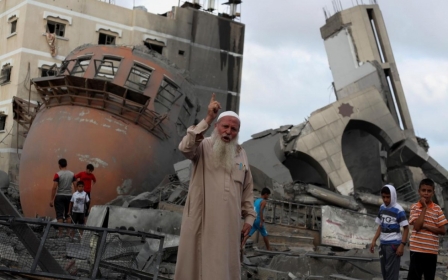Despite hardships, Gaza refugees still seek end to 'life-sapping' blockade

Nearly three weeks of being housed in overcrowded shelter schools in dire living conditions has not dulled Gazans’ desire to see Israel’s blockade on the strip lifted.
Palestinians displaced from east Gaza City following Israeli shelling and bombing of the Shejaiyeh and Tufah neighborhoods have demanded that negotiators in Cairo do not waive their demands during talks – including rights to a sea-port.
MEE interviewed three householders who had taken refuge in the Al-Daraj Elementary Co-ed UNRWA school, less than three kilometres from their homes. They said the conditions were far from healthy, with the intermittent electricity supply also reducing their contact with the outside world.
Ibrahim Zeina, 55, a father of five sons and two daughters, said he would seek an end to what he described as a ”life-sapping” siege before any ceasefire agreement with Israel was made.
His five sons, following their father’s advice, had to cut education short and work with him as building workers after they completed their secondary school, so as not to join the unemployed like his two daughters.
“We have had no work for a year,” said Ibrahim, who was not fortunate enough to find a classroom that could fit his extended family of 34 members – he was sheltering in the open air outside of the school buildings.
“Our people want free trade with the world; we no longer need problems with Israel and Egypt,” he added, referring to the movement of goods and people via the land ports. “War was imposed on us, but there is no harm in war if it is the cost of an independent economy and a dignified life,” he said.
“A lifting of the sea blockade would salvage our economy, and we have no problems with a harbor being installed under European tutelage,” he said, referring to a European Union proposal that it run a Gazan sea-port.
Unhealthy refuge
In the UNRWA schoolyard, there is an unbearable smell resulting from the unfiltered sewage water lining the ground.
While the head of the school said he was not authorized to speak to the media, a teacher-turned aid-worker said on the condition of anonymity that the school is facing emerging health problems.
Scores of people with headaches and milder ailments are being served painkillers on a daily basis, while others diagnosed with more serious fevers and infections are being transferred to external UN health centres.
Oxfam has found some serious disorders inside some shelters such as meningitis, prompting the organization and 12 other British humanitarian groups to establish a Disaster Emergency Committee aimed at transporting urgently-needed health and hygiene materials to Gaza.
Amer Abu al-Kass, 43, is another builder who has been jobless since Egypt sealed the underground smuggling tunnels with Gaza in mid-2013. He receives a monthly food ration from Ministry of Social Affairs, on which his six-member family lives.
Amer considered a Gaza enjoying its own resource of income as a given right. “Our unified delegation in Cairo have to consider our rights to a decent life, and show no submission to Israel on this,” he said.
Gaza-Egypt tunnels were once an alternative to the Kerem Shalom crossing in Israel, after building materials were banned from passing through there in 2007. The ban cost thousands of jobs in the construction sector and this year Egypt destroyed several of the tunnels, deepening the problem.
As for the Egyptian role in the current negotiations, he noted that “Egypt is our Arab representative and should not act as a mere mediator in the Israeli-Palestinian conflict,” asking for more Egyptian pressure to be mounted on the Israeli side to accept the Palestinian demands.
According to the UN Office for the Coordination of Humanitarian Affairs (OCHA) press release, issued on 7 August, only some of the 520,000 displaced Palestinians have returned to their homes. It estimated that over 10,000 housing units have been destroyed or severely damaged, leaving 65,000 with no home to go back to.
Ana’m Abu Saa’da, 41, a widowed mother of six - three sons and three daughters- was less aware of the dealings on the truce.
Her older son, 21, works every day in a sandwich shop to make a living for his family, while another son aged 19 works with livestock feed. The latter has already lost two-thirds of his feed store because of the Israeli shelling of their house in the al-Tufah neighborhood, east of Gaza City.
MEE asking Abu Saa'da if the demands being set forth by the Palestinian parties to reach a long-term truce with Israel met her expectations.
“We are tired. We need to go home.” She said, saying that the canned food distributed to her and the family had made them sick.
“I say to them: Compromise, but not on our rights. Don’t waste our rights,” she implored.
Now that Gaza has seen huge damage to civilian infrastructure facilities and its humanitarian situation worsened, the aim of lifting the blockade has become more urgent.
UN Resident and Humanitarian Coordinator in the Occupied Palestinian territory, James Rawley, said last week that “Without the full lifting of the blockade of the Gaza Strip, Palestinians in Gaza will continue to be deprived of any sense of a normal life and the massive reconstruction effort now required will be impossible.”
More focus is being placed on the EU’s proposed maritime corridor between Gaza and Cyprus, with the European body saying it will guarantee a calm border and a sustainable economic recovery.
“Gaza must become the window of Palestine to the Mediterranean and its port to the world." Swedish Foreign Minister Carl Bildt tweeted last week.
55-year-old Ibrahim may have expressed what many affected and bereaved by war in Gaza think when he said: “We have nothing to lose." He described hope that a war with Israel could prove to be "a problem to solve others," hopeful that it can help Gaza to bloom again.
Middle East Eye propose une couverture et une analyse indépendantes et incomparables du Moyen-Orient, de l’Afrique du Nord et d’autres régions du monde. Pour en savoir plus sur la reprise de ce contenu et les frais qui s’appliquent, veuillez remplir ce formulaire [en anglais]. Pour en savoir plus sur MEE, cliquez ici [en anglais].




